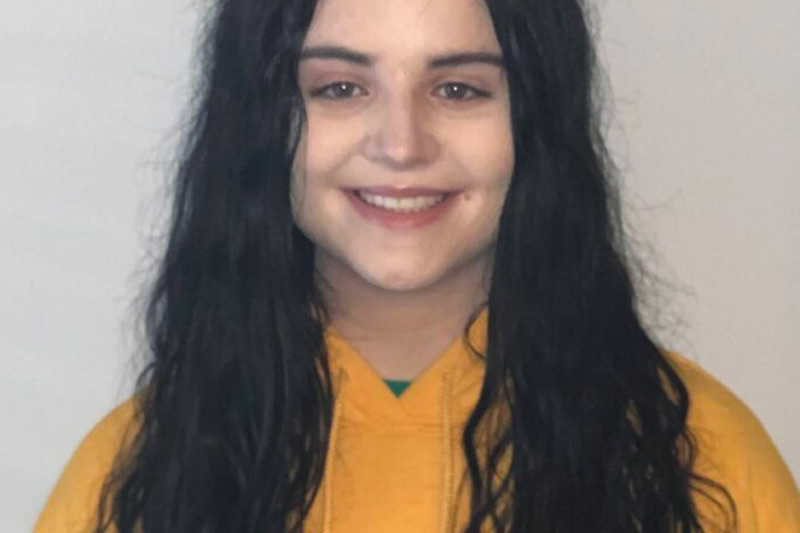Napa Valley College’s College and Career Access Pathways offers high school students early access to college classes and credit

When St. Helena High School (SHHS) senior Chase Chreste completes his calculus class this semester, he will have the satisfaction of not only racking up credit toward his high school diploma, but also of earning his first college credits, thanks to Napa Valley College’s (NVC) College and Career Access Pathways (CCAP) dual enrollment program.
CCAP allows high school students to take college courses at their high schools during the regular day, resulting in credit for both a high school course and the college course, thus the “dual” enrollment.
St. Helena High School math teacher Madison Butts is in his fourth year participating in the program, which for his students replaces the traditional Advanced Placement (AP) high school calculus classes.
“It’s much better for the students because in an AP class, whether or not they pass the class and get credit depends on one big test,” Butts said. “With dual enrollment, they have to master the content and pass the class to get both high school and college credit.”
Chreste says he agrees that CCAP is better. “There is less pressure to just try to learn everything on the AP test,” he said. “I like that you just have to pass the class to get college credit and can actually focus on learning the material rather than cramming for a test.”
Butts stresses that the college content isn’t watered down to make it easier for high school students. “I teach more in line with Napa Valley College’s curriculum. The expectations go up,” he says. “For example, in high school, matrices aren’t typically used in calculus classes. But in college, they are. So NVC’s 120/121 Calculus classes generally line up with a typical AP Calculus class in high school.”
His students aren’t daunted by the challenge, however. This year, all of his senior calculus students and his junior and senior pre-calculus students, a total of 35, are enrolled in CCAP.
“And 100 percent of my calculus students go on to post-secondary education,” Butts says proudly. SHHS senior Rehn Bothos, for example, says he looks forward to continuing his education next year at Point Loma Nazarene University or University of San Diego, with an ultimate goal of becoming a general surgeon.
“I am so grateful that high school students have the opportunity to get college credit at this level,” he says.
The College and Career Access Pathways Partnership was made possible by AB 288, allowing community colleges to enter into formal partnership agreements with local school districts to expand access from high school to community college for career technical education and to prepare for transfer to a four-year institution. Students are more likely to graduate high school on time and be ready for college and careers.
Chreste says he has his sights set on attending UC to study biochemistry or neurochemistry, and is interested in researching psychedelics and other drugs to treat mental disorders.
Those outcomes are exactly what CCAP is intended to support, allowing students to more easily and successfully complete work that leads to an associate degree, and a transfer to a UC or CSU school or to a program leading to a career technical education credential or certificate.
As of spring 2021, when the NVC Board of Trustees approved three agreements with local districts, CCAP courses are available to students at American Canyon High School, Napa High School, Vintage High School, St. Helena High School and, for the first time this semester, Calistoga Junior-Senior High School. In 2020-2021, NVC offer six sections of CCAP courses in NVUSD and SHJUSD, serving 120 students.
In 2021-2022, NVC is offering 27 sections in NVUSD, SHJUSD and now CJUSD, and expects to serve more than 800 students. The expansion of the program includes sections on sanitation and safety; culinary production; statistics; reading and composition; winery operations; and US History, though not all sections are offered at each district.
“We are very excited to be partnering with St. Helena Unified School District to offer a one-year college English course and college-level history courses during fall 2021 and spring 2022 to St. Helena High School students,” said Maria Villagómez, senior dean for library, language arts, social sciences and distance education for NVC.
“Engaging in college-level curricula while in high school is a win-win for our students. The early introduction and courageous commitment to the college classroom environment can only positively impact our students as they embark upon their academic journeys into higher education to achieve their dreams.”
Current high school students are encouraged to explore their opportunities to take advantage of CCAP classes as well as dual enrollment classes offered online and on the Napa Valley College campus. Generally, the first step is to talk with a high school counselor or principal, then apply to Napa Valley College to get the process started.
Recent Articles
- NVC Annual Report 2023-2024
- Murals at NVC's student housing project complete
- Latinx Heritage Month 2024
- Moving day: Napa Valley College welcomes students to new on-campus housing complex
- Graduate praises college as a place of “fertile ground”
- Graduate emphasizes importance of “showing up”
- Future Winemaker Launches Career at NVC
